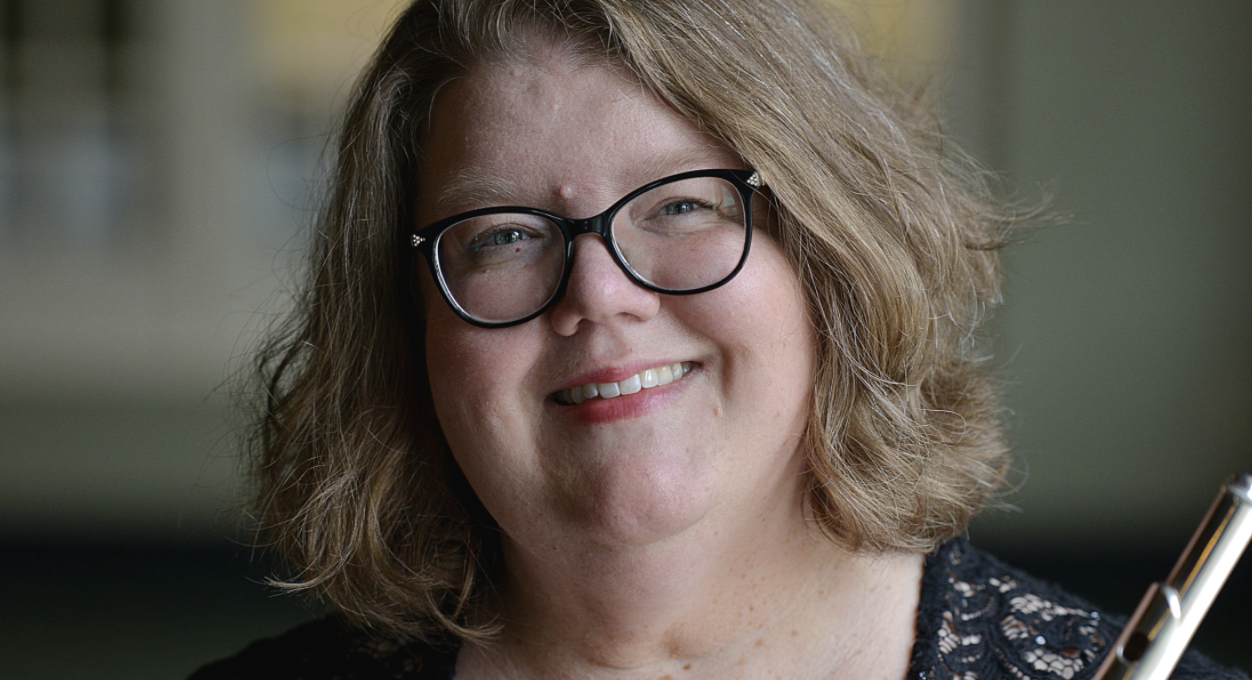Tell us about your studio, including the state that you’re in. What ages do you teach and what are your students like?
This year, my studio is 35 students between the ages of 11 and 50-something. I’m down a little this semester from my high of 55 at the end of February, but I’m finding that to be a bit restorative after a couple of really busy years! My students are from four different county/metro school systems, four additional private schools, one homeschooler and a few college students from a private university. I find that each little community has its own personality and its own way of interacting with me. Some of my students are from one of the most affluent zip codes in the state, and some are the children of immigrants. Sometimes it’s the more affluent ones who struggle, because music isn’t always easy, and you have to put your time in to improve, no matter what.
What are your favorite teaching materials?
With beginners, I tend to choose Trevor Wye’s beginner books or Rubank, which I like as long as I’m around to explain what’s there and what a student should get out of it. With more advanced students I love to teach from the Melodious and Progressive books, Taffanel and Gaubert, all the wonderful Moyse pedagogical books, and Drouet etudes are a perennial favorite.
How has the pandemic changed your studio?
My numbers are definitely down a bit! The thing is, the students who have continued online were already more dedicated, so I find I’m happier with my studio’s general attitude and work ethic right now. And the way teaching online has enabled me to still be part of my community is priceless right now.
What is the most rewarding part of teaching and what has been your biggest challenge?
For me, the most rewarding part is 100% the interpersonal connections. I neither expect or desire to have all of my students become professional musicians, but I adore the moments when they realize that music can be part of your life without being your whole life. I love it when flute lessons help them stand up straighter and move through the world more confidently. That’s the best! The biggest challenge? For me, it’s often saying no! I’m always ready to take on one more kid, even when it means I’m teaching seven days a week. I’m trying to do better about making and taking time for my personal life.
What things that you learned from your own teachers that you say consistently to your students?
From Charlie DeLaney, who was a wonderful teacher and a lovely person: “If you can’t make it art, make it entertainment!” Also, from Ying Li, who was my teacher in high school: “You’ve got to figure out what you must do, on that flute, with your face, to make that note come out just right every time.” She really taught me to understand and learn and play not just the flute but MY flute.
Describe the funniest or most memorable thing that has happened during a lesson on student performance.
Once, I had a sweet younger student, third or fourth grade, who wasn’t playing like herself. We tried a bunch of different things, but she just looked miserable. I finally asked her if she was ok, and she looked up, mortified, and released a tiny, audible fart. It was smellable, too.
What studio policy has been your (sanity) saving grace?
Teaching kids within one school to just talk to each other and exchange lessons when needed has saved my sanity. They know when I’m there—they just have to take the initiative to fix it themselves. It took about a year of my patiently asking them to go talk to each other to really set that up.
If you were able to instill one quality into future teachers, what would it be, and why?
Every student is not the same, and they can’t all be taught the same way. At this precise moment, I have 27 years of teaching experience. I am still learning, thinking and refining my methods and materials. I hope I never stop!
Is there anything else you’d like to share with us?
On occasion, I have wondered if being a professional musician is enough for me to make a difference in the world, to leave this place better than I found it. I’m not a doctor or a nurse, I’m not a social worker or a public motivational speaker or a pastor. But it IS enough, more than enough, one kid and one lesson at a time. We make more of a difference than we know, and I hope I can always find that reassurance when I need it!

